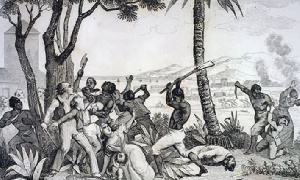Some of these enslaved Blacks served as English interpreters and translators for their Indian slave owners. However, a majority of them worked as laborers on farms of their owners or servants in homes.
Some historians say that Cherokee slaveowners were less barbarous than White slaveowners. But the story of slaveholder James Vann shows otherwise. The half-white half-Cherokee landowner owned around one hundred Black slaves who worked on his plantation in Webbers Falls, Oklahoma. He was described as an abusive alcoholic who terrorized his slaves, sometimes whipping them and even burning their cabins.
But that ceased on the morning of November 15, 1842, when more than 25 enslaved Blacks, mostly from the Vann plantation, revolted. The group joined hands with slaves from other plantations near Webbers Falls in the Cherokee Nation for their escape to Mexico where slavery was abolished.
They began their revolt by locking their Cherokee owners in their homes while they slept. They then stole their guns, horses, food, and ammunition, and escaped toward Mexico. As the group, which included men, women, and children, made their way southwest from the Cherokee Nation, they were joined by ten escaped slaves from plantations in the Creek Nation. The fugitives, now numbering about 35, would fight off and kill some slave hunters in the Choctaw Nation while continuing their journey to Mexico.
A slave revolt was what the Cherokees feared the most at the time. Two days after the escape of the enslaved Blacks, the Cherokee Nation sent the Cherokee Militia, under Captain John Drew, with 87 men to find and bring back the runaways. On November 28, 1842, the militia caught up with the fugitives seven miles north of the Red River. At the time, they were tired, hungry and so couldn’t fight back. Drew and his well-armed men brought the fugitives, 31 in all, back to Webbers Falls by December 8.
The Cherokee Nation Council, following an investigation, directed five of the fugitives to be held at Fort Gibson pending trial for the murders of two slave hunters. The five were later executed. The remaining fugitives were sent back to their Cherokee, Creek, and Choctaw owners. The majority of the fugitive slaves who worked for Vann started working on his steamboats, which worked the Arkansas, Mississippi, and Ohio Rivers.
The Cherokees blamed the revolt on free, armed Black Seminoles who lived close to the Cherokee slaves at Fort Gibson, according to an account by the Oklahoma Historical Society. By December 2, 1842, the Cherokee Nation passed a law demanding all free African Americans, except former Cherokee slaves, to leave the nation.
Today, the 1842 Cherokee slave revolt remains the “largest slave rebellion in the Indian Territory and the only one that involved fugitives from different Indian nations.”
 Home Of Ghana News Ghana News, Entertainment And More
Home Of Ghana News Ghana News, Entertainment And More





